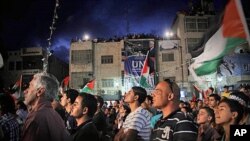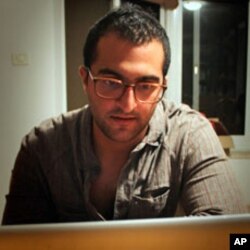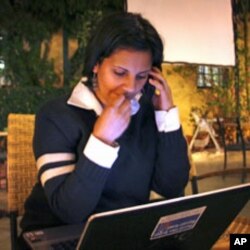Standing boldly in front of the world’s powerful governance body late last month, Palestinian President Mahmoud Abbas said the time has come for a “Palestinian Spring.”
But what exactly that would mean is debated here in the Palestinian territories. As the Arab world erupted this year with uprising and revolutions, Palestinians - who popularized the Arabic word for “uprising” - intifada - have remained relatively quiet.
“The difference is the Palestinian Spring is the leadership and people asking together to end the occupation in a non-violent way,” says Kifah Radaidah, an activist and supporter Abbas’ ruling Fatah movement. “We are telling the world we want a two-state solution. Don’t let us lose this hope.”
While there was some anticipation here that regional changes would improve their position, the situation for Palestinians is different from that of revolting Arab states. For one, they do not have a dictatorial oppressor. Instead, occupation and statelessness have affected their daily life for decades.
For Radaidah, Abbas’ U.N. bid is pollination for this spring. “The Palestinians have been losing hope of years,” says Radaidah. “They don’t see any solution for the problem. But with the bid everyone came together to support Abbas. It has begun for the Palestinians.”
Twenty-five-year-old Palestinian-American Hanna Kassis agrees the move has been good for Palestinian morale and solidarity, but says it not the sort of uprising seen across the Arab world this year.
“There is no spring. That’s a tag line,” says Kassis. “I can’t imagine what a Palestinian spring would look like.”
In recent years Palestinians have practiced non-violent protest, says Kassis. Every Friday, hundreds of Palestinian and foreign activists gather in West Bank villages - “but nobody knows about it,” says he. “We’ve being doing peaceful protests and we just sniff tear gas. The media doesn’t cover that.”
Because of this, Kassis says, a Palestinian Spring would be another intifada.
Negotiation fatigue
Though Abbas said he was ready to return to the table if Israel halted all settlement construction, most Palestinians are quick to dismiss negotiations as a way forward. Talks stalled last year and just last week Israel announced plans to build over 1,000 new homes in the settlement of Gilo.
It is this disappointment with two decades of near-fruitless peace talks and false promises that have compelled many to quickly jump on the U.N.-bid bandwagon. Thousands gathered in central Ramallah to watch Abbas speak at the U.N. and thousand more welcomed him home with flags and cheers.
But it has also elicited frustration among Palestinian youth, particular those belonging to what been coined the “Oslo Generation” - 20-somethings raised with the promise of soon-to-come freedom to be negotiated under the 1993 accords.
More at stake
“[A spring for Palestinians] will mean more than it means to Egyptians and Tunisians or any other nationality in the world,” says 20-year-old Ebaa Rezek. Rezek, took to the streets of Gaza City earlier this year with the March 15 Movement - a collective of youth demanding political unity for their divided Palestinian leadership. Gaza has suffered the brunt of the fallout generated by the Fatah-Hamas rift.
“What deserves the name ‘Palestinian Spring’ is not just some fake statehood, or some meaningless, imposed peace agreements,” says Rezek, sceptical about the benefits of the Abbas’ bid.
Few believe a U.N. recognition would change the situation on the ground for Palestinians. Symbolic statehood will not mean the quick withdrawal of Israeli troops from the West Bank, the dismantling of settlements or a lifting of the Gaza blockade. However, many have argued it would allow Palestinians to better challenge Israel in the international arena. But Rezek cautions: “Talking about holding Israel accountable for crimes in international courts is like a joke to us. Did Lebanon or Syria manage to do that?”
Human rights activist Omar Barghouti agrees, adding that the bid is actually a step backward.
“Palestinian officials are potentially sacrificing most of our people’s claim to basic rights in order to secure some illusory advantages at the negotiations table,” says Barghouti. “It would in effect reduce the Arab Spring to a Palestinian Autumn.”
Barghouti points to the lack of a legitimate mandate for Abbas and the current Palestinian Authority leadership. While Abbas was elected in 2005, new elections should have been held in 2009, but have been postponed for over two years.
“Such an initiative would be strongly supported by all Palestinians - and, consequently, by solidarity groups worldwide - if done by a trusted, democratically elected, accountable leadership,” says Barghouti. “The current leadership is divorced from the will of the Palestinian people and lacks any democratic mandate.”
But Kassis points out that Abbas’ move in New York has been a publicity victory for Palestinians. “What it really did,” says Kassis, “[it] brought Palestinians back to center stage in the world.”
Radaidah adds that the issue now being in the hands of the U.N. will take the battle out of the U.S.-Israel-Palestinian triangle and put it in an international amphitheater. “In the worst case scenario, we will [face a] veto the first time,” says Radaidah, “but we will continue.”






